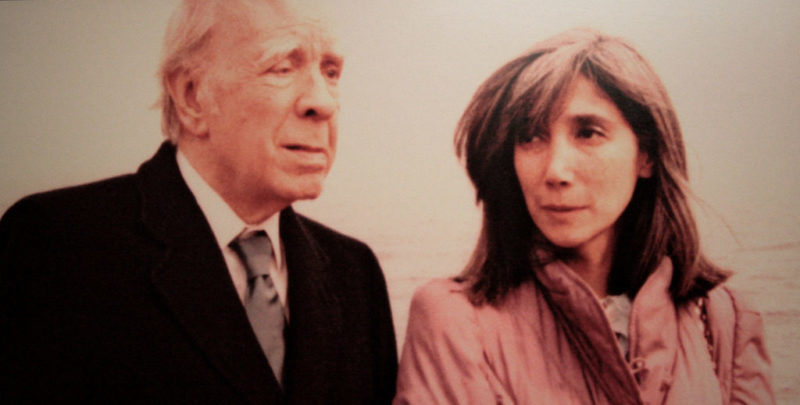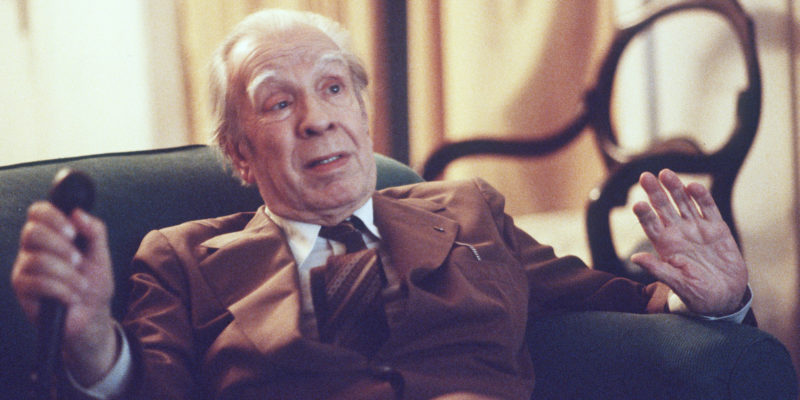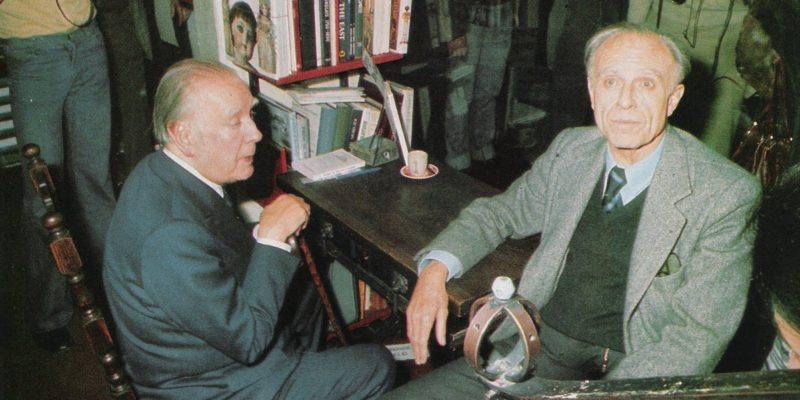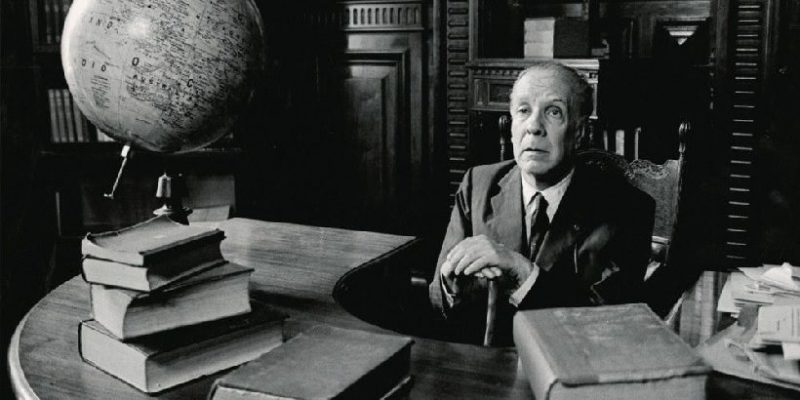We explain who Jorge Luis Borges was, what his life was like and his most famous works. Also, what are its characteristics, death and phrases.
Who was Jorge Luis Borges?
Jorge Luis Borges (1899-1986) was an Argentine writer , considered one of the greatest exponents of Argentine, Hispanic and even world literature of the 20th century .
His work, composed of short stories , poems and essays , shows a very high level of scholarship and an unmatched capacity for inventiveness, which has inspired creators from all latitudes.
Borges was also famous for other reasons , such as his progressive blindness which, however, did not prevent him from pursuing his literary career, and which was due to a congenital disorder inherited from his father.
In addition, his reactionary political positions were known , which would have been the definitive impediment for his work to never earn him the Nobel Prize for Literature , although he was nominated for 30 years.
See also: Rubén Darío
Birth of Jorge Luis Borges
Borges was born in Buenos Aires on August 24, 1899 , the son of Jorge Guillermo Borges and Leonor Acevedo Suárez, after eight months of gestation.
His family descended from a line of Argentine heroes involved in the War of Independence, such as Francisco Narciso Laprida, Francisco Borges Lafinur, Manuel Isidoro Suárez and Juan Crisóstomo Lafinur.
His father broke tradition by dedicating himself to law and psychology , and thanks to that decision the young Jorge Luis Borges had access to an important father's library.
Biography of Jorge Luis Borges

Borges received a privileged education at the hands of English governesses and in a bilingual home.
Then he studied in international schools when his family left for Europe in 1914, so that the father could undergo ophthalmological treatments in Geneva (Switzerland), as he suffered from the same disease that he would later inherit to his son.
The young Borges was precocious in the matters of language and reading , writing his first stories before reaching adolescence .
At the age of nine he translated works by Oscar Wilde , an English writer whom he never ceased to admire, and at the age of twenty-four, his family having already returned to Buenos Aires , he founded, together with Ricardo Güiraldes and other authors, the ultraist magazine Proa .
A year earlier he had published his first collection of poems: Fervor de Buenos Aires , and by 1925 he was one of the most famous names in local avant-garde literature.
In 1940 he met what would be the unconsummated love of his life , Estela Canto, also a writer and translator, and in 1946 he witnessed the rise of Juan Domingo Perón to the presidency, defeating the Democratic Union that Borges supported.
This is how he gained his fame as an anti-Peronist that accompanied him all his life. In fact, his enmity with Peronism was such that he was transferred from his position as librarian at the National Library to that of "Poultry Inspector", forcing him to resign.
Ten years later he would establish himself nationally and internationally as an important literary reference , and he was appointed as director of the National Library in 1955 by the government of the Liberating Revolution , which overthrew Peronism.
Between the 60s and 70s Borges published his best stories and established himself in the Argentine and American academies, and married Elsa Astete Millán, a 57-year-old widow. Borges was already 68.
But in 1970 the marriage dissolved and the writer began his relationship with Maria Kodama , a former student and future second wife, in 1975 .
Most important works of Jorge Luis Borges

Borges's work stands out for its exhaustive cultivation of the short story (6 books), a genre of which it is a mandatory reference today.
His essays (8 books) would also bring him international recognition, not so much his poetry (13 books). Among his most famous works are:
- Fervor of Buenos Aires (poetry, 1923)
- The other, the same (poetry, 1964)
- Universal History of Infamy (short stories, 1935)
- Fictions (short stories, 1944)
- The Aleph (short stories, 1949)
- Inquisitions (essays, 1925)
- The language of the Argentines (essays, 1928)
Awards that Jorge Luis Borges received
His work was effusively celebrated around the world, obtaining awards among which the following stand out:
- Formentor Prize of the International Congress of Writers together with Samuel Beckett in 1961.
- Grand Prize of the National Endowment for the Arts in Buenos Aires, Argentina, in 1962.
- In 1965 he received the insignia of Knight of the Order of the British Empire and the gold medal of the IX Prize for Poetry of the city of Florence.
- He was declared an illustrious citizen of the city of Buenos Aires in 1973, and that same year he received the Alfonso Reyes International Award.
- In 1980 he received the Grand Prize of the Royal Spanish Academy, the Cervantes. That same year he was awarded the Cino del Duca World Prize in Paris and the Balzan Prize in Italy.
- He was nominated for several consecutive years for the Nobel Prize in Literature, but it was never awarded. It is said that the reason for this was to have accepted a tribute made in life by the Chilean dictator Augusto Pinochet.
Ultraism

Borges was part, along with various Spanish authors such as Ramón Gómez de la Serna or Guillermo de Torre, of Ultraísmo, a literary avant - garde movement born around the magazine Ultra (1921).
The attitude that governed this movement was based on certain principles:
- Reduction of the lyric to its primary element: the metaphor.
- Cross-out of dividing phrases, links and useless adjectives.
- Abolition of ornamental work, confessionalism, circumstance, preaching and elaborate nebulosity.
- Synthesis of two or more images in one, thus broadening its power of suggestion.
More in: Ultraism
Disciples of Jorge Luis Borges
Borges had no direct "disciples" as such . But his work and influence have established a school whose footsteps have followed or inspired many great later authors, including:
- Ricardo Piglia (Argentina)
- César Aira (Argentina)
- Roberto Bolaño ( Chile )
- Carlos Fuentes ( Mexico )
- Orhan Pamuk (Turkey)
- Paul Auster (USA)
- Salman Rushdie ( India )
- Umberto Eco (Italy)
- Julio Cortázar (Argentina)
- Julio Ramón Ribeyro ( Peru ).
Recognized friendships of Jorge Luis Borges
 The two great close friends of Jorge Luis Borges who accompanied him throughout his life were also writers Manuel Peyrou and especially Adolfo Bioy Casares , whose marriage to Silvina Ocampo, also a writer and friend, was Borges witness.
The two great close friends of Jorge Luis Borges who accompanied him throughout his life were also writers Manuel Peyrou and especially Adolfo Bioy Casares , whose marriage to Silvina Ocampo, also a writer and friend, was Borges witness.His friendship with the Mexican Alfonso Reyes , who served as ambassador to Buenos Aires from 1927 to 1930, is also known .
Other renowned friendships were those he had with the eccentric artist Xul Solar , with the writers Ernesto Sábato, Ricardo Güiraldes and Macedonio Fernández, as well as with the cartoonist Héctor G. Oesterheld.
Importance of his work
Borges's work has universal significance , beyond local languages and literary traditions. It is studied in academies around the world and is considered one of the top works of the short story.In his writings there is room for general concerns of humanity ( philosophy , existential conjecture and perplexity before the universe ), expressed through a supreme rationality.
His work has served philosophers, mathematicians, semiologists and thinkers from other disciplines to exemplify their theories and develop their own academic works, as in the case of Gilles Deleuze and Félix Guattari.
Last years and death of Jorge Luis Borges
 In 1986 Borges fell ill with cancer and retired to Geneva , where he died on May 14, at the age of 86.
In 1986 Borges fell ill with cancer and retired to Geneva , where he died on May 14, at the age of 86.Following his wishes, he was buried in the Plainpalais Cemetery . According to Bioy Casares, he died reciting the Lord's Prayer: "He said it in Anglo-Saxon, Old English, English, French and Spanish."
Jorge Luis Borges quotes
- "We all walk towards anonymity, only the mediocre arrive before."
- "The noblest thing about the Argentine is friendship, the passion of friendship."
- “For me, democracy is an abuse of statistics. And also I don't think it has any value. Do you think that to solve a mathematical or aesthetic problem you have to consult most of the people? "
- "Friendship does not need frequency, love does."
- "If I undertook a trip alone, I would spend my life going around ... and I would arrive at a customs office, at an airport, possibly I would arrive in Ezeiza and not go beyond Ezeiza."
Anas is an editor of a prestigious publishing company in the United States. She studied Mathematics in Arizona. Anas is also a teacher and one of her long-term goals is to build an institution that offers free education to everyone who are financially not stable. .
Leave a reply
Your email address will not be published. Required fields are marked *Recent post

Sport: What Is It, Types, Risks, Features, Characteristics and Examples

Dogs: Emergence, Features, Characteristics, Feeding and Breeds

Story: Definition, Elements, Structure, Features and Characteristics

